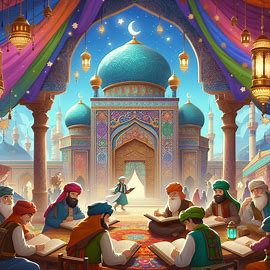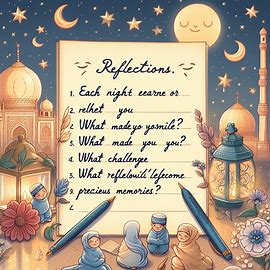Ramadan Fasting: Encouraging Children to Participate in Fasting

Ramadan, the ninth month of the Islamic calendar, holds profound significance for Muslims worldwide. It is a sacred period dedicated to fasting, prayer, reflection, and community. Here are some key aspects that highlight the importance of Ramadan:
- Commemoration of the Qur’an: It is believed that during Ramadan, particularly on the “Night of Power” (Laylat al-Qadr), the first verses of the Qur’an were revealed to the Prophet Muhammad, marking the beginning of the Islamic faith1.
- Fasting (Sawm): Fasting from dawn until sunset is one of the Five Pillars of Islam and is observed by Muslims as a means of spiritual purification, self-discipline, and empathy for the less fortunate2.
- Spiritual Growth: The month offers an opportunity for Muslims to grow closer to Allah through increased prayer, recitation of the Qur’an, and performing good deeds2.
- Community and Family Bonds: Ramadan strengthens community ties, as families and friends often gather to break their fast together during Iftar and engage in communal prayers1.
- Forgiveness and Reflection: Muslims seek forgiveness for past sins, strive to purify their hearts and minds, and make resolutions for better practice of their faith2.
- Charity (Zakat): The act of giving to those in need is emphasized during Ramadan, reflecting the Islamic values of compassion and generosity3.
- Eid al-Fitr: The end of Ramadan is celebrated with Eid al-Fitr, a festive day of gratitude to Allah for the strength to complete the fast and a time for community celebration1.
Ramadan is not just about abstaining from food and drink; it’s a time for inner reflection, devotion to God, and self-control. It’s a chance to cleanse the soul and focus on the spiritual rather than the material aspects of life2
Encouraging Children to Participate in Fasting
Encouraging children to participate in fasting during Ramadan can be a rewarding experience that helps them understand the significance of this holy month. Here are some interesting ways to inspire them:

- Storytelling: Share stories from Islamic history about Ramadan and the importance of fasting. Children love stories, and this can help them understand the spiritual reasons behind fasting.
- Reward System: Create a reward chart where children can earn stickers or stars for each day they fast. At the end of Ramadan, they can exchange these for a special gift.
- Involve Them in Suhoor and Iftar: Let children help prepare the pre-dawn meal (Suhoor) and the meal to break the fast (Iftar). This involvement can make them feel more connected to the practice of fasting.

Aftar Preparations - Educational Activities: Provide books and games related to Ramadan. This can be a fun way to learn about the practices and values of Ramadan.
- Fasting Progress Journal: Encourage children to keep a journal of their fasting experience. They can write about how they feel and what they learn each day. Provide children with a diary to document their thoughts, feelings, and what they are thankful for during Ramadan. This can help them reflect on their experiences

Fasting Progress Journal - Short/ Mini-Fasts: For younger children, start with half-day fasts or a few hours, gradually increasing the time as they grow older and more accustomed to the practice. Encourage mini-fasts where children fast for a few hours and break their fast with a healthy snack. This can be a stepping stone to full-day fasts.
- Positive Reinforcement: Offer praise and positive reinforcement when children complete a day of fasting. Acknowledge their effort and self-discipline.
- Role Models: Share stories of other children who fast or have older siblings who set an example by fasting themselves.
- Visual Countdown: Create a visual countdown calendar for Ramadan so they can see how many days are left and build anticipation for Eid celebrations.

Children’s Ramzan - Cooking Competition: Host a child-friendly cooking competition where they can help make simple Iftar dishes. This can be a fun way to look forward to breaking the fast.
- Spiritual Goals: Help children set personal spiritual goals for Ramadan, such as learning a new dua or helping around the house. Celebrate their achievements at the end of the month.

Children’s Ramzan.
By incorporating these ideas, you can create a supportive and engaging environment that motivates children to participate in fasting and learn more about the values of Ramadan. Remember to keep the activities light and age-appropriate, ensuring that the children’s health and well-being are always the top priority.
Ramadan, especially for the younger ones:
- Interactive Fasting Calendar: Create a fun and colorful calendar where children can mark the days they fasted. They can add stickers or draw on the days they complete their fast, making it a visual and interactive experience.
- Fasting Buddies: Pair up children with a friend or a sibling as fasting buddies. They can encourage each other and share their experiences, making the process more enjoyable.

Children’s Ramzan. - Story Time after Fajr: Organize a story time session after Fajr prayers where children can listen to inspirational stories related to fasting and Ramadan. This can be a calm and reflective time for them.
- Ramadan Crafts: Engage children in making Ramadan-themed crafts, such as moon and star decorations, lanterns, or prayer mats. This can be a creative way to keep them busy and involved.
- Educational Videos and Apps: Utilize child-friendly educational videos and apps that explain the concept of fasting and the importance of Ramadan in an engaging way.
Remember, the key is to make the experience positive and educational, without putting too much pressure on the children. It’s important to respect each child’s capacity and readiness to start fasting.
Ramadan Fasting 2024: Who Is Exempt and When to Relax the Rules


